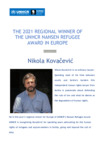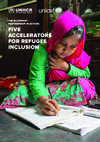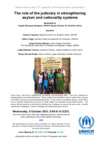UNHCR concerned over ending of rescue operation in the Mediterranean
This is a summary of what was said by UNHCR spokesperson William Spindler – to whom quoted text may be attributed – at today's press briefing at the Palais des Nations in Geneva.
UNHCR is concerned over the announcement of the ending this month of the Italian operation Mare Nostrum without a similar European search and rescue operation to replace it. This will undoubtedly increase the risk for those trying to find safety in Europe, and could lead to more refugees and migrants perishing at sea. It is estimated that 3343 people have lost their lives this year while making such journeys, 2755 of them since the start of July.
UNHCR has welcomed Mare Nostrum, which has contributed to the rescue of around 150,000 refuges and migrants since it began a year ago as a response to two tragedies off the coast of Lampedusa, where over 600 refugees and migrants died. Today, UNHCR reiterates its call for Europe to commit more resources to rescue at sea in the Mediterranean.
It is critical that the long-established tradition of rescue at sea is upheld by all. UNHCR also recognizes the efforts made by many commercial vessels - this year alone they have contributed to the rescue of about 37,000 people. To the extent possible, such rescue must ensure minimal financial impact on the shipping industry. Predictability on places for the disembarkation in safety of those rescued is also required.
In addition, Europe needs to step up efforts to provide credible legal alternatives to dangerous voyages to protect people from the risks of traveling with smugglers. The collective response needs to maintain a strong capacity to rescue people at sea and increase safer ways for refugees to find safety in Europe, including enhanced resettlement, other forms of humanitarian admission and private sponsorship schemes. UNHCR is also calling on European governments to do more to facilitate family reunification and use programmes such as student or employment visas to benefit refugees.
The level of desperation among many of those involved, fleeing war, persecution and violence, including from Syria require our concerted efforts to respond. This trend began in June and July last year, before Mare Nostrum was established, and has continued in 2014. In addition, an increased number of women, children, including many unaccompanied, and elderly people are taking to dangerous sea routes. They face greater risks, are more vulnerable to abuse and have specific needs that require assistance after they are rescued.
These challenges cannot be addressed by a few states alone; a joint European response is needed, based on collaboration among states and EU support. These efforts also need to ensure additional initial reception facilities, adequate reception conditions, assistance in processing as well as identifying solutions for those in need of international protection
For more information on this topic, please contact:
- In Rome, In Rome, Carlotta Sami on mobile +39 335 679 4746
- In Rome, Federico Fossi on mobile +31 349 0843461
- In Geneva, William Spindler on mobile +41 79 217 3011
Related news and stories
First UNITY Cup shows the power of football to connect refugees and hosts
Scholarships in Italy allow refugees to dream again
Relief for asylum seekers offered a new life outside Libya
Evacuation flights from Libya to Italy bring hope for vulnerable asylum seekers
UNHCR and Council of Europe discuss statelessness, urge States to uphold the right to a nationality in Europe
UNHCR warns of mounting refugee and migrant deaths in the Central Mediterranean
-

Winner's bio Europe: English
2 Oct 2021 -

Winner's bio Europe: Spanish
2 Oct 2021 -

Blueprint for Joint Action - Five Accelerators for Refugee Inclusion
1 Oct 2021 -

The role of the judiciary in promoting stronger nationality and asylum systems
1 Oct 2021 -

Your Guide to Protection Care Management
Oct 2021 -

Statelessness and Climate Change
Oct 2021 Climate change is a risk multiplier for displacement. The risks of statelessness can increase when people move, including during displacement situations in the context of climate change and disasters. -

Practical Guidance for UNHCR Staff on IDP Protection in the Context of Disasters and the Adverse Effects of Climate Change
Oct 2021 -

Issue brief - Promising practices from working with RLOs in Europe - UNHCR RBE - September 2021
30 Sep 2021 UNHCR's Regional Bureau for Europe conducted a comprehensive mapping of ongoing initiatives and engagement with refugee-led organizations in 2020. This Issue Brief seeks to summarize the main findings of this mapping exercise, share the promising practices identified in different countries, and provide practical tips to further support and reinforce the work done by refugee-led organizations and refugee-led initiatives across the region. -

EU-level Report on the status of refugee-led community organisations
30 Sep 2021 The main aim of this project is to see a dramatic improvement in the quality of enjoyment of human rights by refugees and is based on the idea of supporting the active inclusion of marginalised, vulnerable or excluded communities. With this, the project seeks to strengthen refugee inclusion by supporting the empowerment of those refugees who want to play an active role in their communities and at the EU level.
